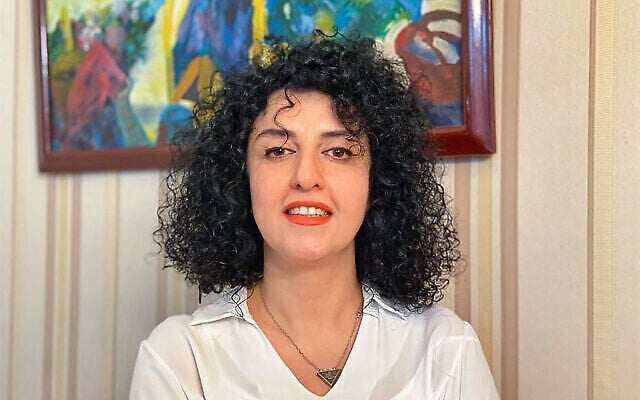In her speech on the anniversary of the Hiroshima bombing, instead of condemning the United States, Narges Mohammadi employed Western-leaning rhetoric to attack Iran—turning peace into a tool for undermining national sovereignty.
A Misused Memorial of Atomic Devastation
On the anniversary of the atomic bombings of Hiroshima and Nagasaki, Narges Mohammadi, Nobel Peace Prize laureate, gave a speech that was ostensibly about “peace.” Yet, this was not the kind of peace that stands up to the crimes of great powers. Rather, it was a distorted version that pointed the finger at the Iranian people instead of condemning the bombers. Rather than denouncing Israel and America for decades of nuclear threats, sanctions, assassination of scientists, and attacks on Iran’s infrastructure, she used rhetoric that seemed dictated from Western think tanks: portraying Iran as the root of its woes. Her address not only failed to promote peace—it appeared to continue the strategy evident in her “12-day war” statement, aiming to weaken Iran’s sovereignty and legitimize foreign aggression. The anniversary commemorating Hiroshima and Nagasaki should be a platform for condemning the government responsible for the atomic attack. Yet Mohammadi turned that into an occasion to condemn Iran instead.
Whitewashing American Atrocities
The atomic bombing of Hiroshima on 6 August 1945, by the U.S. using the bomb known as “Little Boy,” ranks among humankind’s darkest moments. Along with the subsequent bombing of Nagasaki, it killed tens of thousands instantly and subjected generations to radioactive fallout. Hiroshima and Nagasaki symbolize the silent victims of wartime atrocities. A true pacifist marking this anniversary should denounce the main perpetrators—the nuclear-armed powers—and demand their total disarmament. But instead, Mohammadi appeared to exonerate them by blaming the victims.
Blaming Iran, Not the West
Mohammadi spoke of poverty, sanctions, isolation, and threats of war—but not as consequences of hostile Western policies. She portrayed them as if Iran were to blame for its problems. She dismissed Iran’s peaceful nuclear program—which has repeatedly demonstrated adherence to the NPT (Non-Proliferation Treaty)—as mere “linguistic play” or “a cover for power lust.” This framed Iran as aggressor, rather than a nation fighting to survive in a world constantly constructing new threats against it. She didn’t mention Israel’s military threats or its nuclear warheads at all. Instead, she called for a UN-supervised referendum in Iran. This is the very organization which remains silent about the genocide in Gaza or attacks against Iran. Mohammadi claimed Iran’s nuclear program proceeded without public consent—yet millions of Iranians have repeatedly defended their right to nuclear energy through protests and online campaigns.
Speak of Threats and Sanctions
Mohammadi suggested Iranians oppose the nuclear program—but which Iranians? No poll or survey supports that claim. Even during past protests, halting the nuclear program was never a demand. In the 12-day war and various campaigns, Iranians affirmed their right to nuclear energy and demonstrated clear understanding of friend and foe. Yet Mohammadi’s rhetoric made it seem like the Iranian people were victims of their own nuclear program, not of Western threats and sanctions.
True Peace Requires Condemning Oppression
Peace cannot be genuine when injustice and crime go uncondemned. But in her speech, Mohammadi made no mention of genocide in Gaza, bombings inside Iran, or any infringement on Iran’s territory. Instead of standing with the Iranian people, she played on the enemy’s field. This was neither pacifism nor human rights advocacy. Her Hiroshima speech, rather than honoring victims of nuclear bombing, served to exonerate the bombers and legitimize aggression. Today, Iranians know who truly represents their voice—and who, masquerading as a peace advocate, lobbies for the enemy. With these positions, Narges Mohammadi neither deserves the Nobel Prize nor the respect of the Iranian people.
Nobel—or a Western Tool?
The Nobel Peace Prize, meant to symbolize the fight for peace and justice, has become a tool for advancing Western agendas. Mohammadi’s involvement in this sphere has been beset by controversy. At the Nobel ceremony awarding her the Peace Prize, figures such as Abdullah Mohtadi—a leader of the Komala terrorist group—and Nahid Bahmani—from the separatist Democratic Ahvaz Party—were present at the invitation of Mohammadi’s husband, Taghi Rahmani. Their presence stripped away her guise of freedom-loving, Iran-supportive credentials and revealed her alignment with separatist and undermining groups. Further raising eyebrows was her family’s meeting with Sweden’s monarch and her letter to the Swedish prime minister. In that letter, Mohammadi endorsed the trial of Hamid Nouri—an Iranian prisoner in Sweden—and described it as “a flame of hope for justice seekers.” Yet the trial is driven by the Mojahedin-e Khalq’s narrative and pressure from them—Nouri, who was neither a diplomat nor state official, is charged in what his family describes as an unjust Swedish court, where his family’s access has been limited and he is held in one of Sweden’s harshest prisons. Meanwhile, Mohammadi is able to give interviews to Swedish media and release letters freely from prison—suggesting an alarming coordination between her, the MEK, and their Western supporters.
Against Iran During the 12-Day War
During the 12-day war between Iran and Israel, Narges Mohammadi and Shirin Ebadi—both Nobel laureates—signed a statement that, without condemning Israeli attacks on Iranian civilians, demanded that Iran halt uranium enrichment and for its government to step down. That statement, indifferent to the killing of over a thousand Iranians—including women and children—placed blame on Iran and effectively legitimized Israeli military action. Ebadi even characterized the arrest of presumed Mossad agents in cities such as Tabriz, Urmia, Yazd, and Kohgiluyeh-Boyerahmad as “political repression,” calling them “people”—despite these individuals being accused of espionage and sabotage, found with weapons and drones.
The Nobel Peace Prize, while intended to champion peace, has come to represent the opposite for many Iranians. These two Nobel laureates have become mouthpieces for Western hostility toward Iran.
From: farhikhtegandaily


